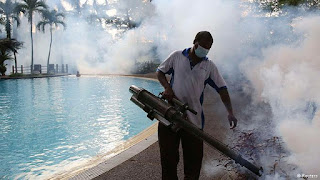 |
| DW TV |
According to Pedro Alonso, WHO Malaria Project Coordinator, massive investment in pro-active measures has helped prevent and sustained 6 millions deaths since 2000. But, almost halve a million people still dies from the disease for the last 15 years and majority were Children.
Malaria as we know is a deadly disease caused by a Mosquito parasite known as Plasmodium Falciparum which in turn leads to severe fever and even death. The disease is widespread among the Africa and Asia minor with more than 50% found in Africa. Tackling the disease needs special supports and awareness, that’s why the world celebrates World Malaria Day each year.
 |
| DW TV |
Three measures that needs to be put in place to prevents this disease inludes:
1. Insecticide-treated mosquito nets (ITN). Most people usually complain of using mosquito nets due to it causing heat and the likes. But, we must learn to use it properly and maintain that significance to help keep a mosquito free generation. For there’s a saying that states; “Prevention is Better Than Cure”.
 |
| DW TV |
2. Larval control by Sprays. Fumigation is also a top priority for preventing many disease causative organisms especially in the larva stages. Always fumigate your environments at least once in a month to help keep you and your family save from malaria and other relative diseases.
 |
| DW TV |
3. Malaria treatment by Drugs. Once diagnosed, artemisinin-based combination therapies (ACTs) are the
mainstay of most treatments for malaria and should be administered
within 24 hours of examination.
Severe malaria should be treated with injectable artesunate and followed
by a complete course of an ACT as soon as the patient can take oral
medicines.
By the end of 2013, ACTs had been adopted as a first-line treatment
policy in 79 countries. In the same year, 337 million ACT treatment
courses were delivered to endemic countries.
The WHO says access to ACTs among children in Africa remains poor but is
improving. Based on data from household surveys and local medical
centers, access rose from less than 1 percent in 2005 to 16 percent last
year, DW, 2015.
Please share the contents to help fight malaria in Nigeria and Africa, thank you.


